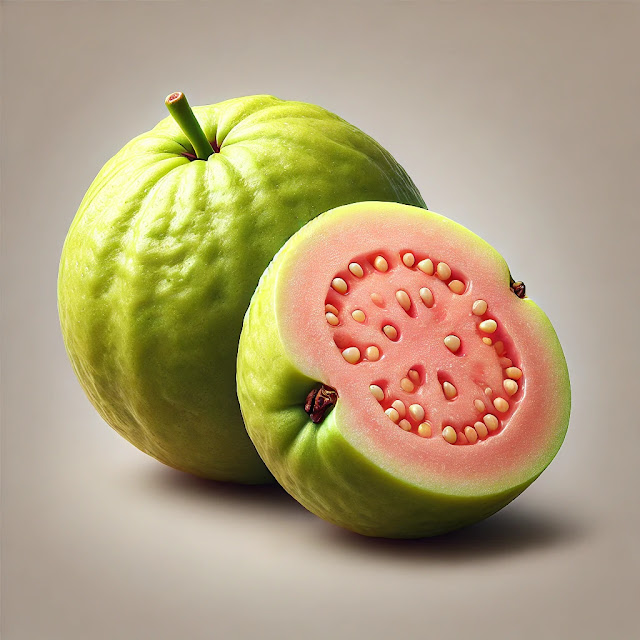Guava: The Tropical Powerhouse Packed with Nutrients and Flavor
Overview:
Guava, with its smooth greenish-yellow skin and vibrant pink flesh, is a tropical fruit celebrated for its sweet, slightly tangy flavor. This exotic fruit, commonly found in tropical and subtropical regions, is not only delicious but also highly nutritious, offering numerous health benefits. Guava can be eaten fresh, juiced, or used in a variety of recipes, making it a versatile ingredient in both sweet and savory dishes.
Calories and Key Nutrients (per 100g):
A 100g serving of guava contains about 68 calories, making it a low-calorie fruit packed with nutrients. Guava is exceptionally rich in vitamin C, providing over 200% of the daily recommended intake in just one serving. It is also a good source of dietary fiber, potassium, and vitamin A. Compared to oranges or bananas, guava stands out with its higher vitamin C content and fiber, making it a superfruit for boosting immunity and supporting digestive health.
Health Benefits:
Guava is often praised for its high antioxidant content, particularly vitamin C, which helps strengthen the immune system and protect the body from oxidative stress. The dietary fiber in guava promotes gut health and regular digestion, while potassium aids in maintaining healthy blood pressure levels. The fruit also contains small amounts of folate and magnesium, which support heart health and muscle function. Guava’s anti-inflammatory properties make it beneficial for those suffering from chronic inflammation.
Proper Consumption Methods:
The best way to enjoy guava is fresh. Simply wash the fruit, slice it, and eat it with or without the skin. The seeds are edible but can be removed if preferred. Guava can also be juiced or blended into smoothies for a refreshing drink. In addition, guava is often used in jams, jellies, and syrups, bringing its sweet flavor to various culinary creations.
Tasty Ways to Eat Guava (Recipes):
One simple yet delicious recipe is a guava smoothie. Blend fresh guava with banana, yogurt, and a touch of honey for a creamy and nutrient-packed drink. Another creative option is guava salsa, made by mixing diced guava with lime juice, cilantro, and jalapeños for a tangy and sweet topping perfect for grilled fish or chicken. Guava can also be added to fruit salads or used in baking for a tropical twist.
Cautions When Eating Guava:
While guava is generally safe to eat, overconsumption of the seeds may cause digestive discomfort for some individuals. Additionally, those with sensitivities to tropical fruits should monitor their intake, as guava can trigger allergic reactions in rare cases. Moderation is key to enjoying guava’s benefits without any side effects.
Comparing Guava to Other Fruits:
Compared to fruits like kiwi or papaya, guava offers significantly more vitamin C, making it a superior choice for boosting immunity. While papaya is known for its digestive benefits due to its enzyme content, guava provides a more balanced nutrient profile, with higher fiber and vitamin A content. Both fruits are excellent for overall health, but guava’s higher antioxidant levels make it particularly powerful for preventing cell damage and supporting skin health.
Who Should Eat Guava and Who Should Avoid It:
Guava is ideal for individuals looking to boost their immune system, maintain heart health, and support digestive function. It’s also a great fruit for athletes due to its potassium content, which helps replenish electrolytes after physical activity. However, people with tropical fruit allergies or those sensitive to high-fiber foods should be cautious and limit their consumption of guava to avoid discomfort.
Interesting Stories or Facts:
Did you know that guava has been cultivated for over 3,000 years and was used in traditional medicine by indigenous cultures in Central and South America? It was considered a "superfruit" long before the term became popular, valued for its healing properties. In modern times, guava has become a global favorite for its flavor and health benefits, often referred to as the "queen of fruits" in tropical regions.
Guava Culture Around the World:
In Mexico and the Caribbean, guava is often used in beverages like aguas frescas, as well as in sweets and preserves. In Southeast Asia, guava is commonly eaten fresh with a pinch of salt or chili powder to enhance its flavor. In India, guava is a popular ingredient in chutneys, juices, and street food. In Western countries, guava has become increasingly popular in smoothies, jams, and tropical-themed desserts.
Scientific Research on Guava:
Recent studies have highlighted guava’s potential to improve blood sugar control, making it a beneficial fruit for individuals with diabetes. The high levels of antioxidants in guava, particularly quercetin, have been shown to reduce the risk of certain cancers and support heart health. Additionally, research has indicated that guava leaf extract may help alleviate menstrual pain and improve symptoms of dysmenorrhea in women.
Conclusion:
Guava is a powerhouse of nutrition, offering a variety of health benefits from boosting immunity to promoting digestive health. Its versatility makes it easy to incorporate into any diet, whether eaten fresh, juiced, or used in cooking. However, as with any food, it is important to consume guava in moderation to avoid any potential discomfort.
This information may not be entirely accurate, so if you have any medical conditions, please consult a doctor before consuming guava.










Comments
Post a Comment